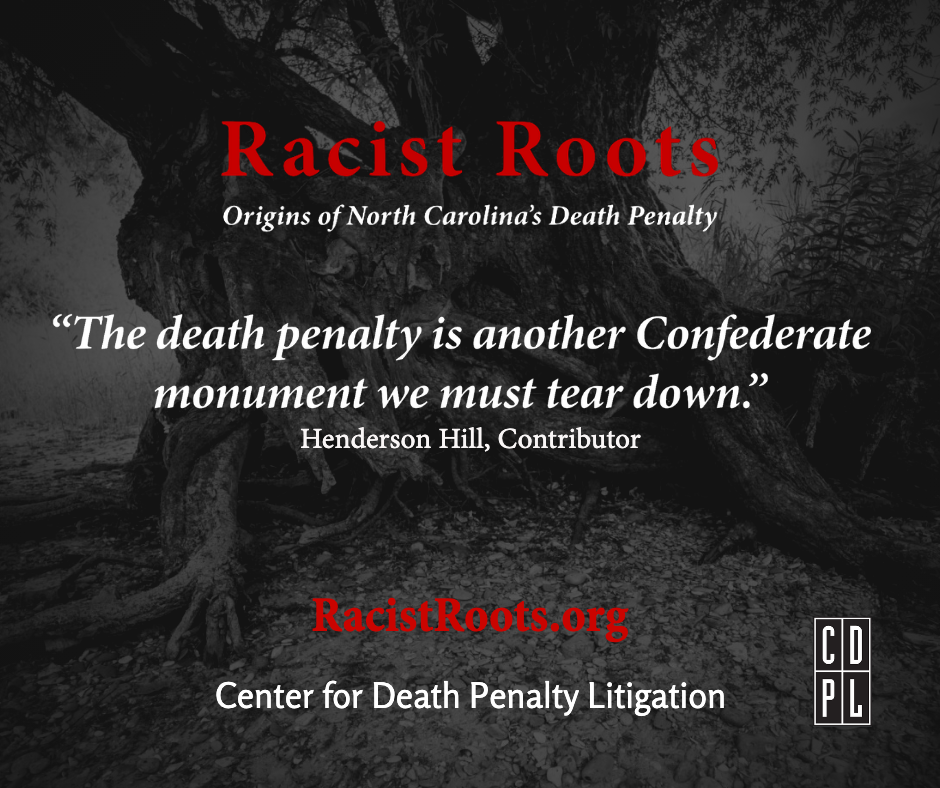For Immediate Release: December 15, 2020
For More Information Contact: Gretchen Engel, CDPL – gretchen@cdpl.org 919-682-3983
Durham — As 2020 ends, the North Carolina death penalty occupies a precarious position in a state coming to terms with systemic racism and sweeping injustice in its criminal punishment system.
There were no new death sentences in 2020, which marks three of the past four years with no death verdicts. Even as federal executions resumed at a stunning pace, North Carolina passed its fourteenth year without an execution. Meanwhile, dozens of the state’s 138 death row prisoners are poised to bring forward claims of racism in their trials and sentences under the Racial Justice Act.
Also, on Monday, Governor Cooper’s Task Force for Racial Equity in Criminal Justice released a report acknowledging that the death penalty has a close “relationship to white supremacy” and lynching. The task force recommended a Truth and Reconciliation Commission that would, among other things, study racial disparities in death sentencing, review commutations of death sentences imposed before 2001, and consider replacing the death penalty with a maximum sentence of life without parole. The task force also recommended that the death penalty be prohibited for people with serious mental illness and those under 21, and said juvenile offenses should no longer be used as aggravating factors in death penalty trials.
“Any honest attempt at truth and reconciliation must begin with the acknowledgment that the modern death penalty is rooted in racism,” said CDPL Executive Director Gretchen M. Engel. “North Carolina’s death penalty was used first as a tool for enforcing slavery and then to police segregation. It’s no wonder that today we have a death penalty riddled with inequity. From the disproportionate numbers of people of color on death row to the death sentencing of innocent Black men, from the exclusion of African-American jurors to the favoring of white victims. If we want to move forward as a society, we must reckon with that.”
In October, CDPL released Racist Roots: Origins of North Carolina’s Death Penalty, a sweeping project that puts the modern death penalty in the context of its history. Dozens of scholars, artists, advocates, and people directly affected by the death penalty contributed to the project, which reveals how racism has shaped and perpetuated the modern death penalty.
Also this year, the N.C. Supreme Court recognized in a series of rulings that race discrimination is a serious and ongoing problem in death row cases.
The court ruled in June that all death-sentenced people who had filed claims under the N.C. Racial Justice Act are entitled to hearings where they can present evidence that prosecutors excluded African-American citizens from their juries and that racism tainted their trials. In two subsequent decisions, the court ruled that four people who had already proven discrimination under the Racial Justice Act had to be removed from death row and resentenced to life without parole, ensuring that death sentences infected by racism will never be carried out. One of those decisions noted North Carolina’s “egregious legacy of the racially discriminatory application” of the death penalty.
“This year, our state’s highest court said very clearly that it’s time to stop ignoring racism in the death penalty,” Engel said. “It’s time to confront the clear and undeniable evidence that race still determines who is sentenced to death.”
Engel continued, “Ending the death penalty is just one small part of what’s needed to finally begin erasing the stain of racism from our criminal punishment system, but it’s an important first step. As long as the state is still trying to execute people in our names, we cannot say we are serious about rooting out the legacy of slavery and racial terror.”

